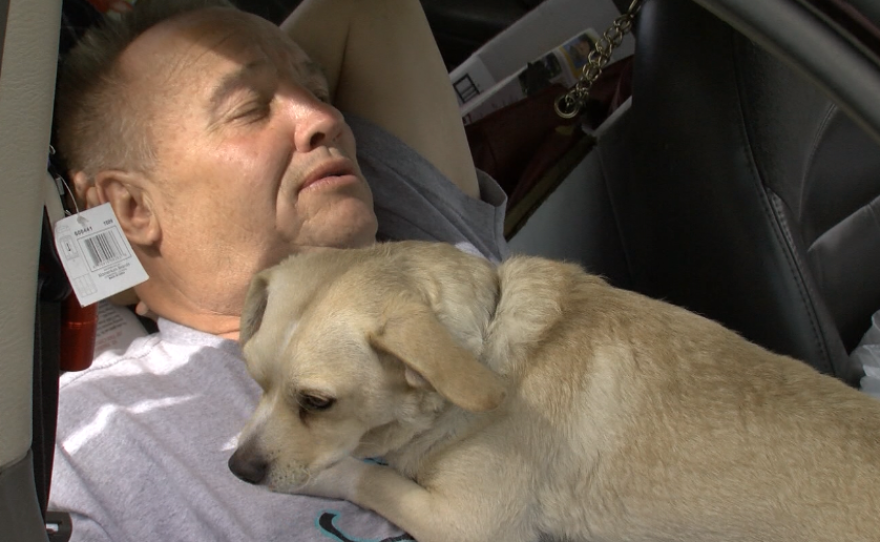Seniors who live on a fixed income are particularly hard hit by rising rents and shrinking rental vacancy rates.

Donald Chester is 57 years old. He’s been living with his wife and small dogs in his car, a maroon PT Cruiser, for almost a year. They lost an apartment last May in a dispute over the rent.
“In the car, it’s kind of a downside, because you have to sleep with one eye open and one eye awake,” he said. “Plus, the police are trying to remove everyone from the streets. But when you’re in a predicament, you can’t help it.”
Chester’s speech is slightly slurred. He has suffered three strokes in recent years. Like many seniors, he survives on a fixed income. His disability check is $970 a month.
He opens the back passenger door of the car to reveal a seat crowded with plastic bags full of clothes, medications and a small dog on a leash.
“This is where my wife sleeps. It’s very, very cramped, but she manages the food and manages a place to sit and a place to sleep in this area,” Chester said. “I sleep in the front.”
Chester’s wife also has a small fixed income from Social Security, but she spends it on storage units for their lifetime of family possessions. They have three children, and one of them lives in Vista, which is why they want to find a home in North County.
Chester opened the trunk of the car to show where they keep their food. There is dried soup that Chester said they can heat up in a microwave at convenience stores. There is also Italian sausage in a plastic wrap, but Chester isn’t sure if it’s already beyond its expiration date. He said if they find a barbecue in a public park where someone has left some charcoal, they can cook their food there.
The PT Cruiser is parked in front of Brother Benno’s in Oceanside. That’s where the Chesters and hundreds of others go for breakfast most mornings. Not all are homeless, some are simply living right on the edge of their budgets and need a little help.
Dennis Pinnick, who works at Brother Benno's, comes out and advises Chester to throw away the sausage, and gives him two sack lunches instead. Then they walk to Pinnick’s office to talk about a bigger problem — finding a place to live.
Chester has one ace in his hand: a Section 8 Housing Voucher from the county.
This housing voucher is a particularly good one, because it is issued by the county and Chester is a veteran. The county is one of five jurisdictions in San Diego that issue housing vouchers and it allows Chester to look for a rental anywhere in the region. He served in the Navy for six years, maintaining the heating and cooling systems aboard the USS Tripoli. His Veterans Housing, or VASH voucher, will pay for an apartment that rents for up to $1,600 a month.
This should allow him to find a one–or two-bedroom apartment where he will only be required to pay one-third of his monthly income toward rent.
But just because he has a voucher does not mean it’s easy to find a place to live.
In Pinnick’s office the two men go over a plan for the next day to visit a possible rental in Fallbrook. Chester is worried he won’t have enough money for gas. He said as soon as he finds a house, he wants to sell the car because he can’t afford to keep it. Pinnick reassures him and offers to drive him there.
But Pinnick is well aware the chances of getting this rental are slim.
“The biggest problem is we live in a county that’s a seller’s market,” Pinnick said. “If I’m a landlord and I have 20 people in line to look at my place and 10 of them have stellar credit, why am I am even going to go through the hassle of a voucher system? Because now they have the government come out and look at my place, to fix things — there’s a big process for them.”
In 2015 it took an average of more than 100 days for a veteran to find a home using a VASH voucher. Now San Diego County is offering incentives to landlords of up to $500 if they are willing to lease to a homeless veteran, and that time has shrunk to 66 days.
“There’s nothing like having a bed to lay your body on,” Chester said. “There’s nothing like cooking on a stove so that you eat your food fresh. People might take it for granted, but for me it means a lot to be able to lay down at night, and it means a lot to be able to cook my food, to keep my food refrigerated.”

More than 10,500 households are currently using the county’s Section 8 housing voucher program. That does not include voucher programs run by the city of San Diego and four other cities in the region. In the city of San Diego, for example, 866 veterans have received housing subsidies to date.
Most homeless veterans in San Diego can get a housing voucher. But for the general population there is a 10-year waiting list for the county’s Section 8 Housing Vouchers. Kelly Duffek, assistant director of Housing and Community Development at the county, said the number of seniors in the program is increasing.
"Between 2005 and 2017, the percentage of elderly family members in our rental assistance programs increased from 15 to 20 percent," she wrote.
Federal funding for the county's program has held steady at about a $104 million a year for the past few years, Duffek said, but as rents increase, the money covers fewer vouchers for fewer families.
With a new administration in Washington DC, future funding of housing vouchers is uncertain.
Voucher Use In San Diego
2012:
–11,202 households leased using vouchers.
–the average monthly cost of a unit was $812.
2016:
–10527 household leased using vouchers.
–the average monthly cost of a unit was $855.
Chester leans against the front fender of his car.
“I’m tired of living like this,” he said.
He waved as he and his wife drove away — the dogs barking in the back.
The Chesters are part of a growing older demographic living on fixed incomes who, without a housing voucher, have little hope of finding a home they can afford in San Diego County.






